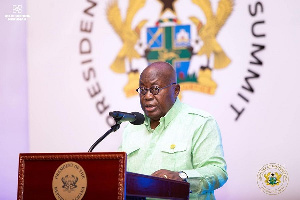 President Nana Addo Dankwa Akufo-Addo
President Nana Addo Dankwa Akufo-Addo
The completion of most of the community day Senior High Schools (E-blocks) the erstwhile National Democratic Congress (NDC) government initiated to help absorb more students into SHSs would have averted the chaotic double-track that is bedevilling the Free SHS programme, former President John Mahama has indicated.
The pro-poor policy was introduced by the Akufo-Addo administration in September 2017 but had to make way for the double-track system because of the high number of students enrolled under the programme.
But Mr. Mahama, who led the NDC into election 2020, in a radio interview on Bogoso-based Trinity FM insists that the E-blocks he government commenced across the country was to cater for the infrastructural deficits in the country’s SHSs while they rolled out the ‘progressively free senior high school policy’.
The Ministry for Education under the leadership of Dr. Matthew Opoku Prempeh announced that the Akufo-Addo government had completed some of the school projects bequeathed to them in 2017.
But Mahama, who is touring the Western Region to thank Ghanaians for their overwhelming support during the 2020 polls, believes the government has not done enough to finish the projects and get students in SHS to study comfortably.
He said the completion of the E-Blocks would have saved the government from running the double-track system.
“Everything you’ll do, you have to apply wisdom. To start the free SHS, you have to know that when you open the gates like that, the children will be many and that means you have to make provisions for the students before opening the gates,” the 2020 NDC Presidential candidate said in Akan.
lamenting the development, he said the failure to complete the E-Blocks has become “a waste of taxpayers’ money”, adding that the government has left the projects unattended to and is embarking on different projects.
“Today some of the schools have been left unattended. If they were operational, there wouldn’t be this double track,” Mahama added. “Because of this, the quality of education is declining and that is why the children want to rely on ‘apor’ (exam leakages) before going to the examination centre.”
He continued, “We have heard how students got angry after their final exams and went on rampage, attacking teachers because they did not allow them to engage in examination malpractices.”
To him, “if the quality of education in the second-cycle institutions is good and you train the children well, we won’t be seeing all these.”
Experts’ Concerns
Mr Mahama’s claim has been corroborated by some experts in the country who believe the double-track is dwindling the quality of education in the country’s public senior high schools.
For instance, a sociologist and lecturer at the University of Ghana, Dr. Sampson Obed Appiah has cautioned policymakers in the country’s education sector to, as a matter of urgency, take steps to tackle the issues that are reducing the quality of education in the second cycle institutions in the country.
Speaking on Tonton Sansan on TV XYZ in August, the educationist observed there were a tad more challenges affecting the quality of education in the government-assisted senior high schools under the Akufo-Addo administration’s flagship free SHS policy which needed urgent attention.
“Because we could not plan ahead of the free SHS, there has been an infrastructural gap which is adversely affecting the quality of education,” Dr. Appiah told co-host Pomaa Kyekyeku and argued that the pro-poor policy has turned into a capitalist idea due to the reduction of contact hours which force parents to resort to paying teachers to take their children through extra classes.
“I attended Mawuli School for 3 years but the only time I did extra classes was when I was in my final year, but today it is not like that. Someone told me at Peki that he is paying GHS 200 cedis for every core subject for his ward to be taught at home,” the lecturer noted.
Dr. Appiah also noted that “the double track has been the most unfortunate policy in our educational system because of the lost of contact hours. Parents would have to spend more on extra classes given room for capitalism which favors the rich to the detriment of the poor and thereby gradually creating a class system in the education sector to allow the rich to be able to get their children to get quality education.”
Asked by Pomaa Kyekyeku about what he makes of the entire second cycle education structure, Dr. Appiah said “at the secondary education level, I can say that the quality is reducing.”
“Something needs to be done because when the pupils do not get the quality education, they will struggle in the tertiary level,” he added and asked the government to go back to the drawing board and correct some mistakes he termed “political.”
Challenges of Free SHS
The challenges confronting the free SHS programme have been reiterated to the government ever since the policy was birthed in 2017.
Students, parents, and teachers have listed the challenges as lack of accommodation facilities resulting in students sleeping on the floor, and congestion in classrooms.
Other challenges pointed out by stakeholders are: the inconvenience relating to erratic schedules for the double-track system, poor quality of food served to students, little attention to end-of-semester examinations, and minimal contact hours.
In May this year, the Ghana Education Service (GES) rallied the support of parents, students, and other stakeholders for the Free SHS Policy, and promised the challenges bedeviling the implementation of the pro-poor policy would be tackled.